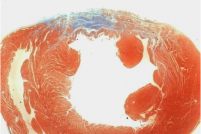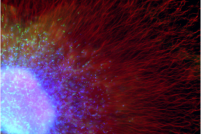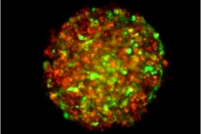The research in the Laboratory for Biomaterials & Regenerative Medicine is focused on rational design of cell-compatible hydrogels, with the goal of improving strategies in tissue repair, stem cell therapy, drug screening, and protein biotechnology.
Our main areas of research are:
Cell-Compatible Hydrogels
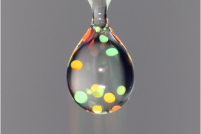 We design and validate semi-synthetic hydrogels made from protein-polymer adducts for various applications, including tissue engineering, cancer drug screening, and investigational mechanobiology. These cell-compatible hydrogels are constructed from water-soluble polymeric building blocks in order to provide coordinated control over physical properties and bioactivity at a cell-material interface.
We design and validate semi-synthetic hydrogels made from protein-polymer adducts for various applications, including tissue engineering, cancer drug screening, and investigational mechanobiology. These cell-compatible hydrogels are constructed from water-soluble polymeric building blocks in order to provide coordinated control over physical properties and bioactivity at a cell-material interface.
Three-dimensional (3D) Cellular Morphogenesis
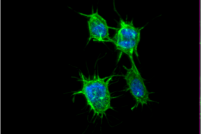 We develop material-based approaches to study and elucidate how cells regulate morphogenesis via physical matrix properties in 3D culture. We use a model system premised on cell-laden hydrogel scaffolds arranged in a “gel-in-gel” configuration for studying three important agonists: matrix stiffness, ligand density, and proteolytic responsiveness
We develop material-based approaches to study and elucidate how cells regulate morphogenesis via physical matrix properties in 3D culture. We use a model system premised on cell-laden hydrogel scaffolds arranged in a “gel-in-gel” configuration for studying three important agonists: matrix stiffness, ligand density, and proteolytic responsiveness
Cell Therapy (Skeletal, Muscle, Cardiac)
We are developing injectable hydrogels for better engraftment of cardiac and skeletal muscle stem cells in various muscle pathologies, including myocardial infarction, traumatic injuries, and muscular dystrophy. In these applications, our cell-encapsulating biodegradable hydrogels have been tested pre-clinically as cell carriers, effectively localizing the cell grafts, providing protection against inflammation and facilitating controlled integration with the host tissue
Tissue Repair (Cartilage, Bone, Nerve)
Our research in tissue repair is focused on engineering biomaterials that can harness natural cellular and molecular healing pathways to enhance functional in situ tissue regeneration, without the use of exogenous cell therapy. Although the healing process that leads to functional regeneration relies on numerous biological events, it can often be catalyzed and sustained by a single inductive factor. Our approach employs natural proteins and their degradation products to facilitate induction of tissue repair.
Stem Cell Mass Production
We are investigating the use of 3D encapsulating hydrogel biomaterials for human stem cell (hSC) bioprocessing. We address the principal requirements for 3D suspension bioprocessing of hSCs using semi-synthetic hydrogel milieus, mainly by developing methodologies for straightforward cell inoculation into microgels, in situ self-renewal and differentiation in a microgel culture system, and mild cell recovery into a solution phase.
Cancer Drug Screening and Diagnostics
We are working on establishing reliable assays for in vitro screening of cancer drug sensitivity based on a tumor culture model system that employs semi-synthetic hydrogels. The 3D culture conditions in the hydrogels better mimic the normal conditions of tumor growth in vivo, enabling more reliable testing methodologies for determining quantitative chemo-sensitivity and optimal drug dosing.
